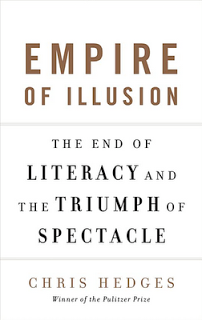Chris Hedges, a former New York Times war correspondent, is not happy with the current state of American civilization, a view he makes crystal clear in Empire of Illusion. Hedges is an independent man of the left and a cultural conservative. Chronicles readers may recall the controversy over his commencement address in 2003 at Rockford College, covered by Scott P. Richert in The Rockford Files (August 2003). In that speech, Hedges delivered a harsh, unpopular, and largely accurate assessment of the coming occupation in Iraq. Empire of Illusion renders a similarly harsh assessment of the state of American culture in 2009.
Empire is a scattershot look at a variety of topics ranging from the porn industry to elite education. Hedges believes that Americans have forsaken reality for a world of lies and empty entertainment. Some of the more troubling results are plain—a series of disastrous foreign wars and a collapsing economy. The major problems we currently face were avoidable, had people paid attention to calls for military restraint and to questions regarding the ability of the housing market to rise indefinitely. In Hedges’ view, Americans are as distracted by fantasy as those who view the shadows on the wall of Plato’s cave:
those who manipulate the shadows that dominate our lives are the agents, publicists, marketing departments, promoters, script writers, television and movie producers, advertisers, video technicians, photographers, . . . pollsters, public announcers, and television news personalities who create the vast stage for illusion.
“[N]othing,” Hedges claims, “is off-limits, including death. As long as it can be packaged and turned into drama, it works.”
As to higher education, “elite universities disdain honest intellectual inquiry, which is by its nature distrustful of authority.” Hedges is particularly critical of the results of specialization, and of the dense jargon that characterizes it, recalling his inability to decipher the meaning of a fellow graduate of the Harvard Divinity School, though he shared her academic training. Of such as she, he insists,
[b]y any standard comprehensible within the tradition of Western Civilization . . . these people are illiterate. They cannot recognize the vital relationship between power and morality. They have forgotten, or never knew, that moral traditions are the product of civilization.
Another jargon-laden field ridiculed by Hedges is “Positive Psychology.” As he describes it, Positive Psychology is a scheme to manufacture happiness out of thin air and institutionalize conformity. Happiness is a slippery concept and difficult to measure, but government agencies, schools, and corporations have adopted the techniques of various Positive Psychology gurus. Hedges, comparing adherents to Positive Psychology with the addled denizens of Huxley’s Brave New World, concludes that
the awful feeling that being positive may not, in fact, work if one is laid off or becomes sick must be suppressed. Here, in the land of happy thoughts, there are no gross injustices, no abuses of authority, no economic and political systems to challenge, and no reason to complain. Here, we are all happy.
In respect of the wars in Iraq and Afghanistan, major media outlets often served as stenographers to sources within the Bush administration. Judith Miller, who worked at the New York Times (Hedges’ former paper), admitted, according to Hedges, that her work was “only as good as [her] sources.” Hedges counters that reporters should “always begin with the assumption that those in power have an agenda and are rarely bound to the truth.” That statement is true of government at all times, but it is especially applicable to the Bush administration’s campaign to sell the Iraq war in 2002 and 2003.
In those heady days, President Bush and his subordinates filled the airwaves, the newspapers, and the World Wide Web with lies, innuendos, half-truths, and hysterical fear-mongering about mushroom clouds rising above America’s towns and cites. Bush-administration officials earnestly counseled Americans to have plenty of duct tape and plastic sheeting on hand in preparation for Saddam’s terror attacks. But when the dust settled, Americans found that they had once again been sold a bill of goods. The former dictator who was fished out of a spider hole and deloused was obviously no threat to the United States, and, while violence has subsided over the last two years, the United States is still mired in an expensive and bloody occupation of Iraq. The arguments against invading Iraq were complex and nuanced, while the case for war was as simple as shouting, “Go team!” The shouters prevailed, as they likely will again when citizens of what Gore Vidal dubbed the “United States of Amnesia” have forgotten about the current conflict.
Hedges argues that
[t]he more we sever ourselves from a literate, print-based world, a world of complexity and nuance, a world of ideas, for one informed by comforting, reassuring images, fantasies, slogans, celebrities and a lust for violence, the more we are destined to implode.
The country faces spiraling debt, seemingly endless wars, and environmental decay, to name only a few of our serious problems; but our political culture is unable to hold a serious discussion about them. Politicians aspire to say as little possible in a substantive way, and the media are bound by their obeisance to corporate interests and p.c. pieties. There is no indication that the American appetite for “complexity and nuance” is increasing.
Although he foresees a “Weimar America,” characterized by debt and decline, on the horizon, Hedges closes with a modicum of optimism. “Hope exists. It will always exist. It will not come through nation-states, but it will prevail, even if we as distinct individuals and civilizations vanish.”
[Empire of Illusion: The End of Literacy and the Triumph of Spectacle, by Chris Hedges (New York: Nation Books) 232 pp., $24.95]

Leave a Reply